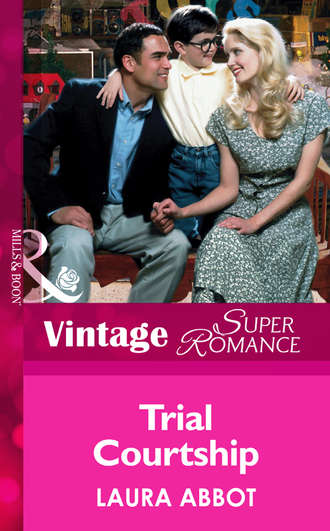
Полная версия
Trial Courtship

“Do you have any computer games, Nick?” Letter to Reader Title Page Dedication CHAPTER ONE CHAPTER TWO CHAPTER THREE CHAPTER FOUR CHAPTER FIVE CHAPTER SIX CHAPTER SEVEN CHAPTER EIGHT CHAPTER NINE CHAPTER TEN CHAPTER ELEVEN CHAPTER TWELVE CHAPTER THIRTEEN CHAPTER FOURTEEN CHAPTER FIFTEEN EPILOGUE Copyright
“Do you have any computer games, Nick?”
Andrea held her breath until the boy answered.
“Why? You play?”
“Only when I have a worthy opponent, Tony said. “Are you any good?”
“Good enough.” Andrea smiled at her nephew’s self-confident tone. She released a mental sigh of relief and stood to clear the main course. She refused Tony’s offer of help and suggested he stay and talk with Nicky.
In the kitchen, she crossed her fingers briefly, hoping her absence would force her nephew to say more than a few polite words to Tony. When she carried the pie into the dining room, she realized her ploy had worked. The two were discussing the scoring intricacies of some intergalactic game.
Tony looked up when she put a plate in front of him. “Homemade? Nick, do you know how lucky you are?”
The boy picked up his fork and held it tightly in his fist “Yeah. I’m lucky, all right.”
Andrea’s stomach twisted with the irony of his comment. Lucky to have lost his parents? Lucky to be living with a single aunt? If only it were simply that he was lucky enough to have someone bake him a homemade pie.
Dear Reader,
I don’t suppose there is a fiction writer anywhere who isn’t a keen observer of others. In fact, my family jokes about my shameless people-watching and eavesdropping in airports, restaurants or any other place where folks gather. Quite simply, I find the human condition fascinating.
Couple that with a lifelong interest in the legal system, and it was only a matter of time before I set a story in a courtroom. A few years ago, my name was drawn as part of a jury pool. The randomness of the process intrigued me, as did the cross section of citizens represented among the potential jurors. What I found especially gratifying was how sincerely each person on the jury worked to try to arrive at a fair and reasonable verdict Were we an unusually conscientious group of twelve? Or is that generally how the process works? I pray we were the rule rather than the exception.
In preparation for writing this book, I spent several days as guest in the Court of Common Pleas, Cuyahoga County Ohio. I came away not only with renewed respect for law enforcement and courts, but with justifiable pride in my gender. Both the bailiff and the judge who assisted me were women—women who performed their jobs with efficiency, fairness and compassion. You know who you are, ladies, and you have earned my utmost respect and gratitude.
You’ve guessed it. The romance writer in me couldn’t resist following the question: “What would happen if a hero and heroine met while they were both serving on the same jury?” I hope you’ll enjoy the outcome of this flight of fantasy.
Laura Abbot
P.S. Please check out my new web site at nettrends.com/LauraAbbot or write me at P.O. Box 2105, Eureka Springs, AR, 72632. Your comments are important to me!
Trial Courtship
Laura Abbot

www.millsandboon.co.uk
For my loving and loyal friend Carol
who asked an important question of me
at just the right time in my life.
With heartfelt gratitude for the hospitality and help so freely
given by relatives and friends, old and new, in the beautiful
city of Cleveland.
CHAPTER ONE
ANDREA EVANS PARKED outside the elementary school to wait for Nicky. The late October sun slanted through the colorful foliage of the massive oaks and maples lining the sidewalk. Across the street in front of a large Tudor-style home, a teenage boy with a rake fought a losing battle against leaves scattered by a stiff wind blowing in from Lake Erie. She buttoned her sweater. Nicky shouldn’t be too long. He knew she’d be there.
Shaker Heights, the beautiful wooded suburb of Cleveland, had been a wonderful place to grow up, she reflected, as she watched two girls strolling along the sidewalk, giggling conspiratorially. And the area remained a desirable location for families with children.
Now, unexpectedly, she was the one rearing a child, the one waiting for the Science Club meeting to adjourn. The one who, no matter how much love and attention she showered on her nine-year-old nephew, couldn’t make up for the tragic loss of his parents.
Despite living with her nearly a year and a half, Nicky still wore that preoccupied, lost look, still appeared some mornings for breakfast with his hair awry, his nails bitten to the quick, his eyes bloodshot. Oh, he loved his Andie well enough—they’d always had a special bond. But she could never replace her older sister Tami as his mother. Nor had she found an acceptable male role model for him, a position her ex-fiancé had refused to consider.
When a boisterous group of students exploded from the school, she searched eagerly for Nicky. He wasn’t among them. She checked her watch. He ought to be along any minute. The children split off in pairs and threesomes and scampered away. Maybe she should go inside.
No, there he was. Head down, dragging his book bag by the strap, Nicholas slowly approached the car. She sighed. He looked so lonely. Opening the door, he threw his belongings onto the back seat, pushed his glasses up on his nose, plopped down beside her and, as an afterthought, pulled the door shut.
“Nicky? Are you all right?” She studied the slightly built, raven-haired boy, who sat, hands folded politely in his lap, studying the ink spot on the left knee of his khaki trousers.
He nodded.
She hated to pry, yet the signals he sent off so often concerned her that it was difficult to keep her mouth shut. Every now and then, he would open his shell a crack, permit her in briefly. Then, as suddenly as he’d revealed himself, he’d clam up.
She drove slowly through the residential area toward home. “What was the program at Science Club today?”
“Bats.”
“That should’ve been interesting.”
“Yeah.”
Nothing about bats hanging by their feet, residing in caves or employing nature’s “radar.” Just “yeah.” Something had happened. She knew it. She tried another tack. “Why didn’t you come out with the other kids?”
“I waited.”
“Oh?”
As if discovering a curiosity, Nicky rubbed the ink stain with a stubby forefinger.
One more try. “Did something upset you today?” She watched a flush creep up his neck. “Nicholas?”
“Jus’ Ben again,” he mumbled.
“Ben? What now?” She steeled herself for his answer.
“He called me a weenie.” He paused before adding, “Said he was gonna beat the crap outta me.”
“Did you tell the teacher?”
He shot her an incredulous look. “What good would that do?”
Poor little guy. Caught between a bully and a rap as a snitch. “Would you like me to call Mrs. Elliot?”
He shrugged. “That’ll jus’ make it worse.”
Heartsick, she turned into the drive of the Cape Cod house that had been her sister and brother-in-law’s home and was now hers. As soon as the car stopped, Nicky bolted, leaving his book bag behind. She stood, shivering a moment in the cool late-afternoon breeze, then bent and retrieved the bag. He wasn’t a thoughtless or bad boy. Just unhappy. And she had no idea how to help him.
Andrea followed him into the house, shrugged out of her cardigan and set water to boil for spaghetti. Then she carried Nicky’s bag upstairs to his bedroom, where he already sat engrossed in a computer game. Software and cyberspace—his retreats. She mussed his hair affectionately. “Dinner in forty-five minutes.”
He didn’t look up. “Okay.”
She paused in the entry hall to gather the mail stuffed in the brass door slot. Sorting through the envelopes as she walked back to the kitchen, she flipped past two bills, then stopped short. What on earth did Cuyahoga County want with her? Her heart skipped a beat. Surely nothing involving her custody of Nicky?
Easing onto the chintz-covered breakfast nook bench, she tore open the envelope. “You are summoned to appear in the Court of Common Pleas... Wednesday, November 18...to serve as a juror.”
Jury duty? Could there be a worse time—right before the holiday rush at her store? Perhaps she could get excused. She quickly censored that unworthy reaction. No question about it, fulfilling her duty as a citizen couldn’t always be convenient. She bit her lip. Serving would involve making arrangements for Nicholas, securing the cooperation of Phil Norman, her shop manager...
Bemused, she acknowledged a nudge of anticipation. She’d always been curious about what went on behind the closed doors of a jury room. And with uncharacteristic immodesty, she acknowledged her ability to be a fair-minded, impartial juror. Despite the bad timing, she would manage, maybe by adjusting her work schedule and hiring additional part-time help.
The hiss of water splattering on the electric burner brought her to her feet. Grabbing two pot holders, she removed the pan from the stove.
She was eager to show Nicholas the letter. They could talk about the court system at dinner. Maybe he’d think that was interesting. She hoped so.
“WATCH IT, KELL. You’re dribbling pickle juice on the contract draft!” Tony Urbanski leaned back in his chair and grinned across the conference table at Kelli Murphy O’Shea, expectant mother and legal whiz.
She waved a dill spear in his general direction. “Just because you’re the newest partner in Great Lakes Management Group, Skee, don’t think you can order folks around.”
He laughed. “Nobody gives you orders. How does Patrick put up with you?”
Rubbing her protruding abdomen, she chuckled wickedly. “Oh, my husband understands there are certain rather delightful compensations.”
Tony nodded at the smeared legal document. “That’s an interesting shade of green.”
She bent her dark head over the page, examining it, then looked up, her blue eyes twinkling. “Ah, laddie, it’s the leprechaun touch, doncha know? The luck of the Irish!”
“It damn well better be. I’m going to need all the luck I can get to put DataTech and Cyberace at the same table and hammer out this merger.” Already he could feel the ripples of tension in his chest. He had a huge stake in pulling off this deal. Harrison Wainwright, managing partner of his firm, demanded results. As the recently appointed head of the mergers and acquisition department, Tony could ill afford to mishandle his first huge negotiation since making partner.
“Hey, Skee.” Kelli reached across the table and patted his hand. “You’ll get the job done. I have every confidence in you.”
Good old Kell. Always the cheerleader. Ever since they’d joined the Cleveland office at about the same time two years ago, they’d been buddies. Her refreshing no-nonsense approach to life kept him honest. She had the uncanny ability to see right through him in ways that often made him uncomfortable.
She withdrew her hand and stood, rubbing the small of her back. “And,” she continued, “you have every confidence in you. That’s what makes you so effective.”
“Are you saying I’m cocky?”
She widened her eyes and regarded him archly. “Now would I say a thing like that?”
He scooped up the papers and rose to his feet. “Damn right, you would.” He stuffed the contract draft into his bulging briefcase, then checked his watch. “Jeez, Kell, I didn’t mean to keep you so late. I hope Patrick won’t be worried.”
“I called him earlier. Besides, you saved me. Patrick is putting up our Halloween decorations tonight. He really gets into holidays. You’d think he was still twelve years old. We’ll have skeletons hanging from trees, cobwebs draped all over the front porch and enough jack-o’-lanterns to illuminate our entire block.”
“I’m sorry. You’re missing all the fun.”
“I’ll have plenty of ‘fun’ getting ready for our party. You’re coming, aren’t you?”
Tony hesitated. He wasn’t much for masquerade parties. “If I’m not too busy.”
“Too busy? Give it a rest. Halloween is on a Saturday night! It’ll be a blast. Do you have your costume?”
Costume? A disconcerting childhood memory surfaced of his father telling him boys didn’t “play dress-up” and that Halloween was for sissies. As a schoolboy, Tony had been forced to sneak bedsheets in order to transform himself into a perennial ghost “I’ll probably come as Urban Businessman, circa late 20th Century.”
“Wow,” Kelli said mockingly. “You really let yourself go, don’t you?”
Tony grasped for a change of subject. “How about you? What are you wearing?”
Kelli ran a hand over her stomach and smiled ruefully. “It seems to me I have two choices—Buddha or E.T.”
“With your big eyes, E.T.’s a natural.”
“I think so, too.” Kelli started toward the door.
“I’ll get my coat and walk you to your car. It’s dark out there.”
“Thanks. I’ll meet you at the elevator.” She paused at the door of her office. “And don’t forget to bring a date to the party!”
“Now you’ve pushed me too far.”
She shook her head disparagingly. “Somebody has to help you meet the right woman. Shall I line up one of my single friends?”
He shrugged. “Do I have a choice?” Before disappearing into her office, she shot him one of those looks that clearly said, “Mother knows best.” Someday maybe he’d think about marriage, family. But not now. He hadn’t worked backbreaking construction jobs to earn his way through Michigan State, driven a cab nights while he finished his MBA and clawed his way up the ranks of Great Lakes Management Group to be sidetracked from his goals. Now that he’d achieved a partnership, he wanted to solidify his reputation as the best negotiator the company had ever had, and that didn’t involve distractions of the female variety.
After delivering Kelli to her car, he walked briskly toward the converted warehouse—now a fashionable downtown address—where he had a third-floor flat. The aroma of hot mustard and sauerkraut wafting from the brown paper bag he carried made his stomach grumble. Thank God Kamp’s Deli had late take-out service. A guy could do a lot worse than the best pastrami on rye in northern Ohio.
Reaching his door, he clutched his briefcase under one arm and fumbled in his pocket for his key. Although it was already after nine, he still had the latest Cyberace annual report to review. But the prospect of another late night didn’t bother him. Deep in his gut, he had the feeling that, despite the obstacles, he could make this merger work.
He pushed open the door to his flat, switched on the lights and set his briefcase and sandwich on the chrome-and-glass table. He was proud of the sleek aesthetic decor—a black leather Eames chair and chrome reading lamp, a white sofa grouping, matching coffee and end tables, Klee and Picasso prints furnishing the only splashes of color. A far cry from his father’s double-wide trailer, which Tony had had to call “home.” Take a look, Pops. Your kid has made it.
Shucking his suit jacket, he shuddered against the distasteful image of Stan Urbanski, with the omnipresent cigar stub clenched in his teeth. Stripping off his tie, he then pulled a bottle of ale from the nearly empty refrigerator. Slowly pouring the contents into a chilled pilsner glass, he raised the drink. Cheers! An unexpected wave of loneliness swept over him. What good was success when there was nobody to share it?
Dispelling the maudlin thought, Tony turned his attention to the thick meaty sandwich, idly thumbing through the day’s mail while he ate. A renewal notice for the Wall Street Journal, an invitation to a charity ball at Shaker Heights Country Club—not bad for a nobody from Detroit—and an envelope with a Cuyahoga County return address. What the hell?
He slit the envelope with his pocket knife and pulled out the enclosed letter. “You are summoned to appear in the Court of Common Pleas...to serve as a juror.” November 18? Shoving his sandwich aside, he stared at the words. Not now! He guzzled the remainder of his ale, then slammed the empty glass down on the table top. Joseph and Mary. That was only three weeks away. Shortly before he had to be in New York City to handle the delicate final merger negotiations.
He started to ball up the offending notice, then thought better of it. No need getting in an uproar. Hell, judges were savvy individuals. Surely when he explained his role in a nationally significant business deal, no judge would insist he serve.
Still, it was damned inconvenient. He’d get on the phone first thing in the morning, speak to someone at the jury commission. With luck, maybe he’d be permitted to serve another time.
PALE NOVEMBER SUNLIGHT shone in Tony’s eyes as he faced Harrison Wainwright across the executive’s imposing desk. “How do you plan to handle your work on DataTech-Cyberace if you can’t get excused from jury duty tomorrow?” Wainwright leaned forward, his steely eyes fixed on Tony, his eyebrows meeting in a frown.
Tony met his colleague’s gaze. “I understand the importance of this merger, and I intend to justify your confidence. Once I talk to the judge, there should be no further problem.”
If only he could be sure. When he’d phoned the jury commission, Tony had been abruptly cut off. “You will have to take it up with the judge on November 18.” But he hadn’t earned his reputation as a skilled negotiator for nothing. “Besides,” he continued, “Barry Fuller is really coming along. I’ll be putting in extra time nights and on the weekends and, with Fuller’s help, I don’t see a problem, even if it turns out I have to serve.”
“I don’t have to remind you that time is critical for Ed Miller at DataTech,” Wainwright continued in his deep baritone. “The new product launch is the linchpin of this merger. DataTech has to get the jump on their competition to secure the projected market share. Their ad agency is already pressing for some decisions.”
Tony shared Wainwright’s sense of urgency. “I’ve spent a lot of time convincing Cyberace’s directors that this is a great deal. And it is. DataTech gets the cash they need to produce and promote their new product, and Cyberace shareholders get a chunk of promising stock in a well-managed company. What’s not to like?”
Wainwright started playing with his fountain pen, screwing and unscrewing the lid. “Cyberace is a closely held corporation. Not everyone over there thinks bigger is necessarily better. That concerns me.”
Tony seized the initiative. “Understandable, but I feel certain we can address the issues to everyone’s satisfaction. Once I’m finished with Cyberace, they’ll be begging DataTech for the merger.”
Wainwright set down the pen decisively and picked up the phone. “Okay, you’re my man, but, Skee, watch your backside with Steelman.” He nodded dismissively and began dialing.
Tony stood. “You can rely on me.” He left the room, pausing outside the office to focus his thoughts.
Rodney Steelman, the founder of Cyberace. Not exactly your Dale Carnegie honor graduate. Territorial, old-fashioned and blunt. In short, just the kind of challenge Tony liked.
On the way back to his own office, he stopped at the receptionist’s station and turned a charming grin on the attractive middle-aged woman. “If anybody’s looking for me in the morning, tell them I’m in court.”
She raised her eyebrows. “What now, Mr. Urbanski?”
“Nothing. Just jury duty. I’ll be back after lunch.” He moved away from her desk.
“Don’t count on it.”
He stopped. “Why not?”
“My sister-in-law was called last year. She had a heck of a time getting excused, even when she explained she was the sole caregiver for her invalid mother.”
“They don’t call me Henry Clay around here for nothing.” He backpedaled down the corridor, giving her a jaunty two-fingered salute.
TONY IMPATIENTLY JABBED the courthouse elevator button again. He’d run over from his office and had about thirty seconds to get to the jury commission on time. Not that he expected everyone else to be dutifully prompt, either. He couldn’t be the only one for whom the summons was inconvenient. The whir of machinery announced the elevator’s arrival before the metal panels slid open. He shifted his laptop computer carrier into his other hand to hold the door for departing occupants. That’s what he’d soon be—a man departing.
As the elevator ascended, he reviewed his progress on the DataTech-Cyberace merger. He’d holed up over the weekend, going over the information he had on both companies, finding weaknesses in the positions of each—weaknesses he intended to exploit with all the skill of a high-tech surgeon probing a vital organ. It was relatively simple to point out the advantages of a deal, but a good negotiator needed to know when to apply pressure, when to back off and how to predict the consequences.
His secretary was compiling complete bios for each of the principals. As he’d explained to Barry Fuller, the junior associate in his department, tactics were nothing without knowledge of personalities and vulnerabilities. This afternoon he’d scheduled a meeting with his technical people for an update on product viability. Two weeks to go until game time—December 2, when he’d be in New York getting names on the dotted line. Maybe his success would even etch a smile on the granite features of Harrison Wainwright.
The elevator stopped, and Tony stepped into a nearly vacant hallway. He took a deep breath, then entered the large jury commission room where, during the orientation, he’d learned that his only out depended on a trial judge’s dismissing him. He ground his teeth in frustration. If the gods smiled, maybe he’d get on a jury right away and quickly fulfill his civic obligation.
Miraculously, he was one of the first to be sent to a courtroom. He gave himself a mental high five, gathered up his belongings and followed a uniformed deputy who shepherded a group of about thirty upstairs to the courtroom. There the deputy directed them to spectators’ seats in the large, high-ceilinged chamber, paneled with vertical strips of wood. A man with the facial features of a tortoise and the build of a fireplug introduced himself as the bailiff, then approached Tony and pointed at his laptop computer. “You, sir. That’ll have to go. No electronic devices are allowed in the courtroom.”
“Other people brought books and magazines. What’s the difference? I have work to do.” The woman sitting next to him shied away as if to disassociate herself from him.
“Today your work is this court.” The bailiff gestured impatiently. “Give it to me.”
“Now just a darn minute—”
“You can pick it up after today’s session. You got a beeper or cell phone?”
“You’re going to take the phone, too?”
“Judge’s policy. You don’t wanna be in contempt. Just hand them over, sir.” There was a definite acidic twist to the “sir.”
Reluctantly, Tony relinquished his laptop and phone. What was he supposed to do during down times? Count ceiling tiles?
“All rise,” the bailiff bellowed. The assembled group shuffled to their feet. “The Cuyahoga County Court of Common Pleas is now in session, the Honorable Hilda Blumberg presiding.” A female judge? He’d have to rethink his strategy for getting excused. Wearing a judicial robe, a tall severe-looking woman with straight salt-and-pepper hair pulled back and secured at the nape of her neck, entered, nodded unsmilingly at the potential jurors, then settled into the large leather chair behind the bench. “Be seated,” the bailiff barked.






